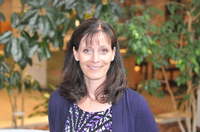By Mary-Margaret Mara
At the beginning of every school year, I find myself pondering what my students will be like, what their needs will be, and whether I will be equipped to meet those needs. Even with twenty five years of teaching experience, I know that there is always room for me to grow as an educator. I've had numerous opportunities to see that teaching is about so much more than using academic strategies to help a child learn. Teaching is about reaching the whole child. One little boy showed me just how important that is - and how much learning I still had to do.
It was my second year teaching preschool in the Worcester Public Schools when Ricardo joined my class. He was very active and often threw seemingly random tantrums. After seeking help from adjustment counselor, we decided to do a home visit to check in with the family.
When I walked into the apartment, I walked into Ricardo's world. There was just one bedroom with three mattresses on the floor where the four family members slept. The conversation with Ricardo's mother turned to a recent drive-by shooting. The bullet had entered the apartment through the kitchen window; the newly patched wall was where it landed across the room. I could see Ricardo's mother standing by the refrigerator as her children watched the incident play out. It was at that moment that I understood. This little boy who had been such a challenge to me faced challenges far beyond anything I had ever experienced. Ricardo was not in my life to make it more difficult. He was just trying to survive with the weight of the world on his shoulders.
That moment forever changed the way I teach. I couldn't control Ricardo's life outside of school, but I could adjust my attitude and the way I interacted with him. It became clear to me that in order to meet the diverse needs of all of my students, I needed more specialized training.
Since then, professional development that connects the impact of children's social-emotional needs to academic achievement has been hard to find. Instead school and district data have been the driving force in most of our PD options. No one has asked what would help me to grow as an educator - and what it could do to help children like Ricardo.
Now, with the new Every Students Succeed Act (ESSA), we have a unique opportunity to change how we develop PD for teachers. Here is how I think we need to improve:
Listen to Teachers
The time has come to ask teachers what their needs are and then plan accordingly. Listening to teachers can help to create professional development that empowers them to share their stories. Teachers like me need behavior management techniques and strategies on how to address what lies beneath the surface of our students' behaviors.
For me, the most effective development on social-emotional learning has been through Responsive classroom, Positive Behavior Intervention System (PBIS), and the professional learning communities (PLCs) where teachers share and then implement strategies and techniques in their classrooms.
While these resources are a good step forward, we need more professional development on how to build positive family connections, and on how to develop strategies and techniques for challenging students.
Involve Teachers in Planning and Implementation
Great professional development starts with direct involvement from teachers on planning and implementation. ESSA clearly stipulates that teacher voices should be part of determining appropriate and useful professional development activities. The inclusion of teachers in this process will help to develop professional development that is driven by both student and teacher needs.
Ask Teachers What They need
Let's start by asking teachers through surveys or open forums. Let them know their voice matters in this process. If we want stronger educators, we must empower them with the tools to grow. Professional development on how to fuse social-emotional and academic learning can provide teachers with the opportunities to share effective classroom management, family involvement, and academic strategies.
Educators can learn new ways to build classroom community and will then see the positive impact connections and relationships with their students and families have on academic achievement.
Professional development created by teachers, for teachers can become an effective form of educating each other. It helps us to grow together by sharing what we need and how we can achieve meeting those needs. High-quality PD shaped by educators may very well be the key to making success possible for every student.
Mary-Margaret Mara is a preschool teacher in an inclusion classroom at Chandler Magnet School in Worcester, MA. She was a 2014 Worcester Public Schools Teacher of the Year, and 2017 Massachusetts Teacher of the Year Finalist. Mary-Margaret is a Teach Plus Commonwealth Teaching Policy Fellow.
